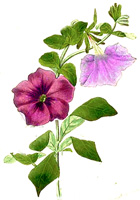MARCH:
Fertilize
Orchid cactus after buds are set and again after flowers.
Cymbidium or orchid - hi-nitrogen till July - every ten days
Azalea - cottonseed on surface
Hydrangea - acid now and again before bloom. Cottonseed will do.
Roses: feed well now and each time they come into bloom, with a long acting commercial fertilizer, or use the fertilizer with systemic insecticide and do no spraying except for later for mildew with fungicide.
Lawns get 10-6-4 now.
Daylily, liquid hi-bloom or superphosphate. Repeat after each bloom period.
Fuchsias, last feeding of bloodmeal March 15, thereafter balanced fertilizer on the acid side.
Camellias may be planted.
Repot Orchids before June.
Spray Holly with oil spray only if it needs it, for black sooty mold.
Prune Hibiscus, removing one/third growth, about March 21.
Pinch fuchsias
This is a very good month for cutting and seeds as it is warming up at night. Cuttings of Hydrangea, Fuchsias, Begonia leaf cuttings, Marguerite cuttings, and Zonal Geranium tip cutting now.
Make a moss lined hanging basket and fill it with petunias from a flat, now, and in a few months you will have a bloom that last about six months. Fertilize regularly. Use about 2 dozen plants.
Root some tuberous begonias in oak leaf mold now. I f you have no luck in shade, try in full sun after they have been rooted, and transplanted. Mine stayed in full sun till the second hot spell in Sept. and I am one and a half miles from the ocean.
Get Dahlias in now. Put bonemeal an inch below them. Stake now.
Plant a couple of cherry tomatoes in a large redwood basket and hang it in the sun. One basket will keep two people in salad tomatoes, as well as being decorative.
This is the month to enjoy all of the annuals you planted last fall. Keep after weeds, and bait for snails, and don't let either get ahead of you this month.
Most plants need fertilizer regularly. Folia feed or get a fertilizer that can be thrown around like snail pellets and doesn't need to be worked in. Fruit trees can't be expected to produce fruit without fertilizer.
Florence Sullivan
Fertilize
Orchid cactus after buds are set and again after flowers.
Cymbidium or orchid - hi-nitrogen till July - every ten days
Azalea - cottonseed on surface
Hydrangea - acid now and again before bloom. Cottonseed will do.
Roses: feed well now and each time they come into bloom, with a long acting commercial fertilizer, or use the fertilizer with systemic insecticide and do no spraying except for later for mildew with fungicide.
Lawns get 10-6-4 now.
Daylily, liquid hi-bloom or superphosphate. Repeat after each bloom period.
Fuchsias, last feeding of bloodmeal March 15, thereafter balanced fertilizer on the acid side.
Camellias may be planted.
Repot Orchids before June.
Spray Holly with oil spray only if it needs it, for black sooty mold.
Prune Hibiscus, removing one/third growth, about March 21.
Pinch fuchsias
This is a very good month for cutting and seeds as it is warming up at night. Cuttings of Hydrangea, Fuchsias, Begonia leaf cuttings, Marguerite cuttings, and Zonal Geranium tip cutting now.
Make a moss lined hanging basket and fill it with petunias from a flat, now, and in a few months you will have a bloom that last about six months. Fertilize regularly. Use about 2 dozen plants.
Root some tuberous begonias in oak leaf mold now. I f you have no luck in shade, try in full sun after they have been rooted, and transplanted. Mine stayed in full sun till the second hot spell in Sept. and I am one and a half miles from the ocean.
Get Dahlias in now. Put bonemeal an inch below them. Stake now.
Plant a couple of cherry tomatoes in a large redwood basket and hang it in the sun. One basket will keep two people in salad tomatoes, as well as being decorative.
This is the month to enjoy all of the annuals you planted last fall. Keep after weeds, and bait for snails, and don't let either get ahead of you this month.
Most plants need fertilizer regularly. Folia feed or get a fertilizer that can be thrown around like snail pellets and doesn't need to be worked in. Fruit trees can't be expected to produce fruit without fertilizer.
Florence Sullivan









2 comments:
Excelent piece of advice. Thank you so much. For begonia first of all. We simply love this flower!! <3!
Nice post, I have already bookmarked this page to read more posts later on.
Post a Comment